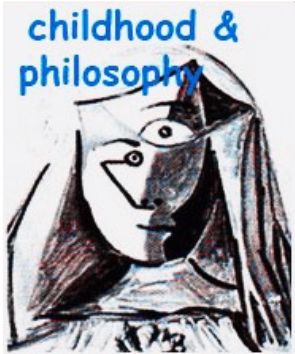come promuovere (educare) una comunità di indagine-jazzante: suggestioni libere e condivise da un workshop internazionale (ICPIC 2022)
DOI:
https://doi.org/10.12957/childphilo.2023.70680Parole chiave:
pedagojazz, jazzing, ricercare, P4wC, performance.Abstract
Questo contributo presenta la riflessione collettiva e tutti i suggerimenti che sono emersi dalla Comunità di ricerca (CdR) temporanea, creata durante un workshop internazionale presentato alla XXa conferenza biennale dell'ICPIC “Philosophy in and beyond the classroom: P4wC through cultural, social, and political difference”. Il workshop, intitolato “Pedagojazz—Improvising and inquiring, community interplay”, è stato condotto tramite Zoom, ma i partecipanti erano sia online che in presenza. Il tema era incentrato sulla prospettiva della pedagojazz e le brevi attività proposte miravano a coinvolgere la CdR (temporanea) dei partecipanti in una discussione collettiva su come sarebbe possibile educare una comunità di ricerca e trasformarla in una comunità di ricerca-jazz. Sono state introdotte tre premesse come sfondo comune su cui sviluppare le nostre riflessioni: la prospettiva della pedagojazz, la connessione già sviluppata tra le sue parole chiave e i diversi ruoli del facilitatore in P4wC, e l'idea che il jazz e in particolare l'improvvisazione collettiva possano influenzare lo sviluppo di una CdR. In questo lavoro vengono presentate le prospettive della pedagojazz e dell'improvvisazione collettiva, e vengono descritti in dettaglio i concetti connessi. Durante il workshop sono state utilizzate la chat Zoom e il sito Wooclap per coinvolgere tutti i partecipanti e raccogliere i loro contributi e suggerimenti. Sono state prodotte una Word cloud e tre tabelle che vengono qui presentate. Sono emerse sollecitazioni e prospettive interessanti che possono aiutarci a riflettere in modo più complesso sull'educazione P4wC della comunità e dei facilitatori al di là delle differenze culturali, sociali e politiche.Downloads
Riferimenti bibliografici
Attali, J. (1985). Noise: The political economy of music. University of Minnesota Press.
Barrett, F. (2012). Yes to the mess: Surprising leadership lessons from jazz. Harvard Business Review Press.
Bourdieu, P. (1992). Risposte. Per un’antropologia riflessiva. Bollati Boringhieri.
D’Olimpio, L., & Teschers, C. (2015). Playing with philosophy: Gestures, performance, P4C and an art of living. Conference for the Philosophy of Education Society of Australasia (PESA).
Demozzi, S., & Ilardo, M. (2020). Educational deontology in the community of philosophical inquiry. childhood & philosophy, 6, 1–16. doi: 10.12957/childphilo.2020.45955
Dewitt, Z., & Kingan, E. (2021). Forum theatre meets philosophy for/with children: Physically exploring challenging situations in the community of philosophical inquiry. childhood & philosophy, 17, 1–25. doi: 10.12957/childphilo.2021.53904
Echeverria, H. & Hannam, P. (2017). The community of philosophical inquiry (p4c) – a pedagogical proposal for advancing democracy. In M. R. Gregory, J. Haynes, & K. Murris (Eds.). The Routledge International Handbook of Philosophy for Children (pp. 3–10). Routledge.
Fischlin, D.; Heble, A. & Lipsitz, G. (2013). The fierce urgency of now: Improvisation, rights and the ethics of cocreation. Duke University Press.
Gould, S. J., & Vrba, E. S. (1982). Exaptation – a missing term in the science of form. Paleobiology, 8(1), 4–15.
Gregory, M. R., & Laverty, M. J. (2018). In community of inquiry with Ann Margaret Sharp. Childhood, philosophy and education. Routledge.
Gur-Ze’ev, I. (2010). Diasporic philosophy and counter-education. Sense.
Hamilton, A., & Konitz, L. (2007). Conversation on the improviser’s art. University of Michigan Press.
Kennedy, D. (2004). The role of a facilitator in a community of philosophical inquiry. Metaphilosophy, 35(5), 744–765.
Kennedy, D., & Kohan, W. (2021). some ethical implications of practicing philosophy with children and adults. childhood & philosophy, 17, 1–16. doi: 10.12957/childphilo.2021.61025
Kizel, A. (2016). Philosophy with children as an educational platform for self-determined learning. Cogent Education, 3(1), 1–11.
Kizel, A. (2021). the facilitator as self-liberator and enabler: ethical responsibility in communities of philosophical inquiry. childhood & philosophy, 17, 1–20. doi: 10.12957/childphilo.2021.53450
Kohan, W., Santi, M., & Wozniak, W. (2017). Philosophy for teachers: Between ignorance, invention, and improvisation. In M. R. Gregory, J. Haynes, & K. Murris (Eds.). The Routledge International Handbook of Philosophy for Children (pp. 253–259). Routledge.
Lipman, M. (1995). Moral education higher-order thinking and philosophy for children. Amsterdam: Early Child Development and Care, 107, 61–70.
Lipman, M. (2003). Thinking in education, 2nd ed. Cambridge University Press.
Preston-Roedder, E. (2020). What can philosophy learn from improvisational theatre? Precollege Philosophy and Public Practice, 2, 18–35.
Santi, M. (2016). Education as jazz: A framework to escape the monologue of teaching and learning. In M. Santi, E. Zorzi (Eds.) Education as jazz. Interdisciplinary sketches on a new metaphor (pp. 3–27). Cambridge Scholars.
Santi, M. (2017). Jazzing philosophy with children: An improvisational path for a new pedagogy. childhood & philosophy, 13(28), 631–647. doi: 10.12957/childphilo.2017.30038
Sawyer, K. (Ed.) (2011). Structure and improvisation in creative teaching. Cambridge University Press.
Scott, T. (2007). The pedagogical imperative of musical improvisation. Critical Studies in Improvisation, 3(2), 1–12.
Sharp, A. M. (1991). The community of inquiry: Education for democracy. Thinking in Education, The Journal of Philosophy for Children, 9(2), 31–37.
Small, C. (1987). Music of the common tongue. Wesleyan UP.
Taleb, N. (2012). Antifragile: Things that gain from disorder. Random House.
WHO (2001). International classification of functioning, disability and health http://apps.who.int/iris/bitstream/handle/10665/42407/9241545429.pdf;jsessionid=39B462609A921B87C2657909578FB3E1?sequence=1.
Woods, P. J. (2022). The collaborative pedagogies of solo improvisation: Learning through performance in noise music. Critical Studies in Improvisation, 15(11), 1–12.
Zorzi, E., & Santi, M. (2020). Improvising inquiry in the community: The teacher’s profile. childhood & philosophy, 16, 1–17. doi: 10.12957/childphilo.2020.46692




